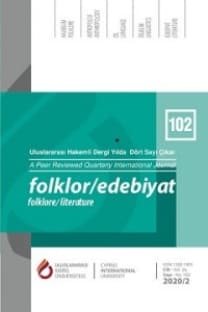Pozitivizmin Alman Edebiyatına Yansıması
Pozitivizm, Auguste Comte, Alman edebiyatı, modernleşme
SNAKE, WATER, SAYING AN ASSAY OF COMMENTARY ON THE RELATIONSHIP BETWEEN MISOGYNY AND THE FEAR OF THE UNCEARTAINTY
fear of the uncertainty fluidity, misogyny, patriarch, symbol,
___
- Aytaç, G. (2005) Yeni Alman edebiyatı tarihi. Ankara: Akçağ.
- Baumann B.- Oberle B. (2000) Deutsche literatur in epochen. Ismaning: Max Hueber.
- Bertl, K.D., Müller U. (2000) Vom naturalismus zum expressionismus. Literatur des kaiserreichs. Stuttgart: Ernst Klett.
- Best, O. F. (2004) Handbuch literarischer fachbegriffe. Frankfurt am Main: Fischer Taschenbuch.
- Frenzel, H.A.- Frenzel E. (2004) Daten deutscher dichtung. Band 2. München: Deutscher Taschenbuch. Gigl, C.J. (2008) Deutsche literaturgeschichte. Stark.
- Hauptmann, G. (1970) Bahnwärther Thiel. Stuttgart: Philipp Reclam.
- Holz, A. - Schlaf, J.(1978) Papa Hamlet. Ein Tod. Stuttgart: Philipp Reclam.
- Korte, H. (2011). Einführung in die geschichte der soziologie. VS Verlag für Sozialwissenschaften.
- Köker, L. (2013) İki farklı siyaset. Ankara: Dipnot.
- Kunisch, H. (1967) Kleines handbuch der deutschen gegenwartsliteratur. München: Nymphenburger.
- Müller, H. M. (1986) Schlaglichter der deutschen geschichte. Mannheim: Bibliographisches Institut.
- Ollila, S. (2014) Der naturalismus des späten neunzehnten jahrhunderts in den werken bahnwärter thiel von gerhart hauptmann und maailman murjoma von juhani. Universität Oulu.
- Piechotta, H.J. - Wuthenow, R.R.; Rothemann, S. (1994) Die literarische moderne in europa: band 1: erscheinungsformen literarischer prosa um die jahrhundertwende. Westdeutscher.
- Rothmann, K. (2003) Kleine geschichte der deutschen literatur. Stuttgart: Philipp Reclam jun.
- Stöckmann, I. (2011) Naturalismus. Lehrbuch Germanistik. Stuttgart: J.B. Metzler. Ulfıg, A. (1997). Lexikon der philosophischen begriffe. Wiesbaden: Fourier.
- Wiegmann, H. (2005) Die deutsche literatur des 20. jahrhunderts. Würzburg: Verlag Königshausen & Neumann GmbH.
- Žmegač, V. (1980) Geschichte der deutschen literatur vom 18. jahrhundert bis zur gegenwart. Band II/1). Königstein: Athenäum.
- ISSN: 1300-7491
- Yayın Aralığı: 4
- Başlangıç: 1994
- Yayıncı: -
Yabancı Uyruklu Öğrencilerin Türk Halk Sanatı – Edebiyatı Unsurlarını Öğrenmeleri ve Aktarımları
Marksizm ve Romantizm Arasında: Ernst Bloch’un Eserlerinde Çocukluk ve Eğitim
Batı’nın Osmanlı Coğrafyasına Bakışını Tersine Çeviren İrlandalı Şair: James Clarence Mangan
Anne’in Hileli Oyun Torbası: John McGahern Edebiyatında İrlanda Folkloru, Gelenek ve Kimlik
Selamlaşma Bağlamında Üsküdar/Selami Ali Efendi Menkıbesinin Göstergebilim Açısından İncelenmesi
Pozitivizmin Alman Edebiyatına Yansıması
Anadolu Türk Kültürünün Tasavvufu Açıklama İşlevi: Cabbar Kulu Kitabı Örneği
